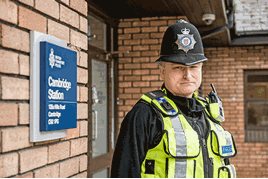Cambridge is hardly known for being a hotbed of crime or anti-social behaviour. The city is a far cry from the counter-terrorism activities and armed patrols associated with London - the constant scourge that is bicycle theft and the drunken misadventures of the city’s large student population might seem more akin to the idea of law enforcement in this ancient seat of learning.
Away from the colleges and the classical façade of the 1845-built Eastern Counties Railway station, PC Paul Gray and the British Transport Police’s new offices are located in the shadow of Cambridge Power Signal Box.
What is immediately apparent is the expanse of Cambridge BTP’s patrol area - Gray can be called to any part of the railway network throughout West Norfolk, Cambridgeshire, West Suffolk and North West Essex.
Falling within its jurisdiction are long and sparsely populated sections of the Fen Line to King’s Lynn via Ely, the Breckland Line to Norwich via Thetford, and routes from Ely to Ipswich and to Peterborough via March. To the south of the city are its two routes to London via Hitchin or Bishop’s Stortford.
“Norwich, Ipswich, Colchester, Stevenage and Peterborough are the nearest other BTP stations, and we fill the big gap in the middle,” says Gray.
“From here we cover an area ranging from the Wash and King’s Lynn all the way down to Stansted Airport. And we have ten million passengers going through Cambridge every year, which is a major, major station.
“I did 11 years on the Underground and now 11 years here, and it’s completely different. There’s a big contrast between rural and urban policing - out here we are everything.”
Sitting within the Eastern region of the BTP’s territorial sub-structure, there are just six PCs and a sergeant based at Cambridge. The prevalence of crime and the number of call-outs is unsurprisingly a small fraction of the level officers must respond to in the capital, but the disparity in available resources necessitates a much wider-reaching job specification for the officers on provincial duty.
“We don’t have squads here, we don’t have CID, and anything specialist we have to call in from elsewhere,” Gray explains.
“Out here we will deal with everything from beginning to end. We don’t just arrest people and hand them over - we do all the investigation, CCTV requests and so on. Unless it’s a major crime, which we will hand over to CID.
“If someone’s in custody, and that could be in Braintree, King’s Lynn, Newmarket or wherever, I will travel out and deal with them from the first interview right through to gathering evidence for any subsequent investigation and preparing the file for the Crown Prosecution Service.”
In keeping with most similarly-sized BTP stations, Cambridge is not manned 24 hours a day, nor are all six PCs ever all on call at the same time. Working in eight- or ten-hour shifts, the station only stays open for as long as the trains are running.
However, Gray explains that close integration with local constabularies and neighbouring BTP stations ensures there is always adequate coverage, despite the small number of officers based at Cambridge and the large rural area they must police.
“We don’t do night shifts here. That’s covered by our ‘mothership’ post, which is Stevenage. The trains end here at about 0130 and the station is then locked up and shut. We work until 0200 on Thursday, Friday and Saturday nights to mainly deal with anti-social behaviour.
“We would always like more PCs - as everyone else would, I expect - but we are a close-knit team and we rely on having really close links with the local police. We help them and they help us.
“Back-up can be a long way away, so you tend to police in ways which will buy you time. The best weapon is often not handcuffs or a baton, but by talking and buying yourself time that way.”
Gray is quick to point out that this type of policing has its benefits. Having fewer colleagues enables closer relationships with railway staff and the local community, while he also clearly relishes the variety of policing scenarios that only comes with working away from London.
“Because we are the railway police, we get to know staff quite well and we are the friendly face. They don’t have to deal with lots of different police officers, and generally see the same one. This means that they tell us stuff, so it helps with intelligence gathering. It’s almost like the old days of having the local bobby.
“This image of us sitting around waiting for the radio is completely false, which in London can sometimes be the case if they are on specific response.
“The day job can vary enormously, from patrolling at King’s Lynn when the Royal Family travel to Sandringham by rail, to policing football fans going to see Cambridge United.
“Last month we had an unexploded bomb here from the Second World War, which the builders discovered beneath some new toilets. It turned out to be a bullet after we evacuated the station.
“So it is very satisfying to have responsibility for such a large area. We are trusted to get on with it, with such a small team, whereas in London you are given a particular task and it’s very orderly managed. Here we come in and we don’t have a plan at the start of the day.”
Inevitably, covering a predominantly agricultural area stretching across miles of flat fenland, Gray and the team must deal with their fair share of level crossing enforcement and near-misses involving farm vehicles at isolated points of the network. Fatalities are another occupational hazard, and a sadly unavoidable task that falls within the BTP’s remit.















Comment as guest
Comments
No comments have been made yet.